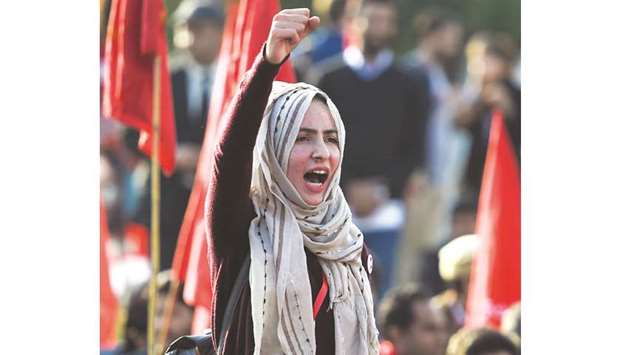Amid a strong countrywide demand by students for restoration of unions in educational institutions, Prime Minister Imran Khan hinted that his government might lift the 35-year-old ban on student unions after devising a comprehensive code of conduct for grooming the youth as leaders of the future.
“We will establish a comprehensive and enforceable code of conduct, learning from the best practices in internationally renowned universities, so that we can restore and enable student unions to play their part in positively grooming our youths as future leaders of the country,” he said in a tweet.
However, the prime minister regretted that unions in the country had forgotten their responsibilities, going off-track and turning campuses of educational institutions into “battlefields”.
“Universities groom future leaders of the country and student unions form an integral part of this grooming. Unfortunately, in Pakistan student unions became violent battlegrounds, destroying the intellectual atmosphere on campuses,” he said in another tweet.
Pakistan Muslim League – Nawaz (PML-N) information secretary Marriyum Aurangzeb has criticised the prime minister for calling student unions “violent battlegrounds”.
Student unions in colleges and universities had been banned across the country through a martial law order by military ruler General Ziaul Haq on February 9, 1984.
The reason cited for the ban was violence on university campuses, allegedly perpetrated by student wings of political parties.
In 1988, then-prime minister Benazir Bhutto lifted the ban and elections were held in colleges and universities in 1989, but that was the last time.
Students across the country have been holding demonstrations for the past week, calling upon the government to restore unions in colleges and universities.
During their protest, many students were detained and cases registered against them.
In Lahore, the Civil Lines police registered a case against 300 persons for staging a protest demonstration at Faisal Chowk on Friday.
The FIR was registered under Sound Act, Law and Order Act and 144CrPc (Section 144 of the Criminal Procedure Code).
Members of civil society and students had staged a protest at the Faisal Chowk to demand the restoration of student unions.
Police arrested Alamgir Wazeer for delivering a provocative speech against national institutions.
Meanwhile, students staged a demonstration on the New Campus bridge against the arrest of students and the FIR against 300 students at Civil Lines police station.
They blocked traffic and chanted slogans against the government.
Pakistan Peoples Party (PPP) chairman Bilawal Bhutto Zardari lashed out at the government for registering first information reports (FIRs) against the students.
A number of politicians of the Pakistan Tehreek-e-Insaf (PTI) including Science and Technology Minister Fawad Chaudhry, have supported the lifting of the ban on student unions.
Two years ago, the Senate Committee of the Whole had recommended unions’ revival in educational institutions, and adopted a resolution.
The senators were of the view that Zia banned student unions because he wanted to sack independent-minded teachers and to nip resistance in the bud.
They said that the unions provided a platform for students to excel and groom themselves for politics, and raise their voice for their rights.
In 1993, the Supreme Court prohibited the formation of student unions, and called for a proper mechanism should the government decide to revive them.
However, successive governments did not take any step for the revival of traditional student politics.
The Senate has however adopted a resolution, and former Senate chairman Raza Rabbani gave a ruling, after lawmakers from both sides of the aisle expressed concern over the continued ban on student unions, and called for an immediate revival.
The issue came under discussion on a motion tabled by Rubina Khalid of the PPP, stressing the “need for revival of student unions in educational institutions in the country, particularly colleges and universities”.
Rabbani said then that the ban through a martial law order had been imposed by the dictatorial regime in violation of the Constitution, which allowed every citizen the right to form an association or union.
He said that Zia had banned the unions after he saw formation of a student alliance against his rule.

This picture taken on Friday shows a student shouting slogans during a demonstration in Islamabad demanding the reinstatement of student unions, education fee cuts, and better education facilities.
